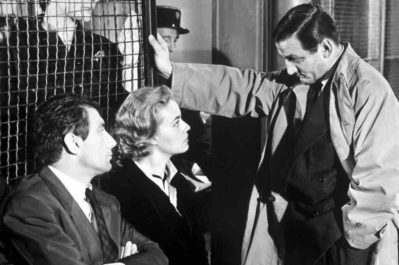REVIEW: ‘Elevator to the Gallows’ follows unraveling of botched murder plan

Louis Malle’s Elevator to the Gallows is a simple, yet addicting, film noir featuring fine performances, a wondrously karma-filled plot, a beautifully powerful score from Miles Davis and evocative imagery. The film, currently playing New York City’s Film Forum in a new restoration, is a late 1950s cinematic gift, a drama that is taut, sexy and intense.
Jeanne Moreau plays Florence Carala, a woman is who cheating on her well-to-do husband, Simon Carala (Jean Wall). Her lover is Julien Tavernier (Maurice Ronet), and as lovers do in film noir classics, they plot a murderous scheme to take out Simon and live their days in blissful joy. Of course, their plan goes horribly, horribly awry.
The actual killing of Simon works according to the rulebook. Julien sneaks into his office, shoots the big-wig businessman and sets up the scene to look like a suicide. The problems begin for Julien after he leaves a rope dangling from Simon’s balcony. He decides to sneak back into the office building after hours to retrieve the evidence, but he soon enough finds himself stuck in an elevator after the electricity is shut off. Florence is left wondering what happened to her romantic partner.
A side plot involves a young couple (Georges Poujouly and Yori Bertin) who steal Julien’s car while he’s stuck in the elevator, and they decide to traipse around the city and country posing as Mr. and Mrs. Julien Tavernier. By the film’s end, after 90 minutes of some well-earned suspense, the two plots come together in a satisfying finale.
The look of the film is wonderfully noirish. The city of Paris is evocative, especially at night, and Julien’s attempts to escape the stalled elevator utilize effective camerawork to heighten the intensity. Helping with the atmosphere is Davis’ score, which is dominated by the wailing of a lonesome, jazzy trumpet. The music is not overdone, but when used in the film, it cuts through the narrative like a knife.
The acting is never over the top, which is saying something for this time period in cinema. The drama is heightened by the setting, music and plot. The characters, on the other hand, stay in the realm of realism, dealing with actual consequences to their actions. When Julien leaves the rope behind, the plot changes. When the young couple steal Julien’s car, they must face an altered future.
In many ways, Elevator to the Gallows is a story about people realizing they’ve gone too far. Even if Julien and Florence love each other — there are no real scenes displaying their love, but the audience guesses they are madly in love with each other — their choice of handling the situation is wrong, illegal and murderous. They deserve to be caught; however, there’s also that audience reaction of wanting to see if they can actually get away with the crime. They don’t deserve to, but one wonders if they can thwart the police and keep their juggling act going.
When watching Julien and Florence wiggle out of trouble, Moreau comes off as the strongest in the ensemble. She’s able to be heartfelt in one scene, direct and powerful when dealing with the police, and sly and secretive when scheming behind the scenes. Ronet is also quite good, especially in those scenes when he’s stuck in the elevator, and he must display his character traits physically rather than through dialogue.
Malle, who wrote the script with Roger Nimier, adds a karmic element to the movie, which serves a few purposes. In one way, the idea that “what goes around comes around” helps to ground the characters in reality. In another way, it ensures humanity wins out over malevolent decision-making.
By John Soltes / Publisher / John@HollywoodSoapbox.com
- Elevator to the Gallows
- 1958
- Directed by Louis Malle
- Written by Malle and Roger Nimier; based on the novel by Noël Calef
- Starring Jeanne Moreau, Maurice Ronet, Yori Bertin, Georges Poujouly and Jean Wall
- Running time: 92 minutes
- Rating:





